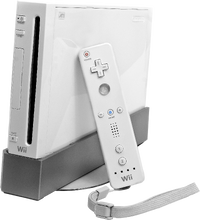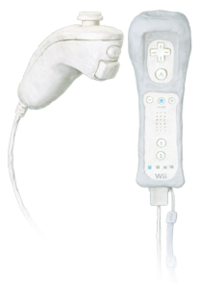Wii: Difference between revisions
(Cleaned up.) |
No edit summary |
||
| (9 intermediate revisions by 5 users not shown) | |||
| Line 1: | Line 1: | ||
{{game icons|p=y|p2=y}} | {{game icons|p=y|p2=y}} | ||
[[File: | [[File:Nintendo Wii.png|thumb|A Wii.]] | ||
{{external|Wii|[[nintendo:Wii|NintendoWiki]]|NintendoWiki logo.png}} | {{external|Wii|[[nintendo:Wii|NintendoWiki]]|NintendoWiki logo.png}} | ||
The '''Wii''' is [[Nintendo]]'s fifth home console, released on {{date|19|November|2006}} in the United States, on {{date|2|December|2006}} in Japan, on {{date|7|December|2006}} in Australia, and on {{ | The '''Wii''' is [[Nintendo]]'s fifth home console, released on {{date|19|November|2006}} in the United States, on {{date|2|December|2006}} in Japan, on {{date|7|December|2006}} in Australia, and on {{date|8|December|2006}} in Europe. It has sold over 101.63 million units worlwide{{cite web|https://www.nintendo.co.jp/ir/en/finance/hard_soft/|IR Information: Sales Data - Dedicated Video Games Sales Units|Nintendo.com}}. Its controller is the first in a Nintendo video-game system to use a motion sensor to control games. It is capable of playing [[GameCube]] games and so can play both ''[[Pikmin (game)|Pikmin]]'' and ''[[Pikmin 2]]''. The respective ''[[New Play Control!]]'' versions of each of these are specifically for the Wii, and use its motion controls. ''[[Super Smash Bros. Brawl]]'' is also played on this console, which has Olimar and Pikmin as a playable character. | ||
In 2008 it was announced that ''[[Pikmin 3]]'' was planned for the Wii.{{cite web|http://www.mywii.com.au/NewsDetail.aspx?id{{=}}2551|''Pikmin 3'' confirmed to be on Wii|MyWii}} However, at E3 2011 it was announced that ''Pikmin 3'' would instead be released on the [[Wii U]].{{cite web|http://uk.wii.ign.com/articles/117/1173945p1.html|''Pikmin 3'' will now be on Wii U|IGN}} | In 2008 it was announced that ''[[Pikmin 3]]'' was planned for the Wii.{{cite web|http://www.mywii.com.au/NewsDetail.aspx?id{{=}}2551|''Pikmin 3'' confirmed to be on Wii|MyWii}} However, at E3 2011 it was announced that ''Pikmin 3'' would instead be released on the [[Wii U]].{{cite web|http://uk.wii.ign.com/articles/117/1173945p1.html|''Pikmin 3'' will now be on Wii U|IGN}} | ||
| Line 20: | Line 20: | ||
===''Super Smash Bros. Brawl''=== | ===''Super Smash Bros. Brawl''=== | ||
Some Pikmin content can be found in the [[Super Smash Bros. Brawl|third installment]] of the | Some ''Pikmin'' content can be found in the [[Super Smash Bros. Brawl|third installment]] of the {{ssbs}}. [[Captain Olimar]] was added as a new fighter in this game, and a stage based on [[PNF-404]], [[PNF-404#In the Super Smash Bros. series|Distant Planet]], made its first appearance. | ||
== Controller == | == Controller == | ||
[[File:Pm2 whats new.png|thumb | [[File:Pm2 whats new.png|thumb|Clay versions of the Wii Remote and Nunchuk.]] | ||
The Wii's main controller is the Wii Remote (also known as Wiimote), which has the shape of a regular television remote. This controller has several extra peripherals, most importantly, the Nunchuk. The Wii Remote has six buttons (plus the Home ({{button|wii|home}}) button, which allows reconnection of controllers, resetting the game and other options regardless of which game is being played) and a D-Pad ({{button|wii|pad}}), as well as a pointer on the front which can tell its own position in relation to a motion sensor (placed in front of the television set) and motion detection technology. The Nunchuk can be connected and disconnected from the Wii Remote and has two triggers, the Z ({{button|wii|z}}) and C ({{button|wii|c}}) buttons, as well as an analog stick ({{button|wii|stick}}), but limited motion detection. | The Wii's main controller is the Wii Remote (also known as Wiimote), which has the shape of a regular television remote. This controller has several extra peripherals, most importantly, the Nunchuk. The Wii Remote has six buttons (plus the Home ({{button|wii|home}}) button, which allows reconnection of controllers, resetting the game and other options regardless of which game is being played) and a D-Pad ({{button|wii|pad}}), as well as a pointer on the front which can tell its own position in relation to a motion sensor (placed in front of the television set) and motion detection technology. The Nunchuk can be connected and disconnected from the Wii Remote and has two triggers, the Z ({{button|wii|z}}) and C ({{button|wii|c}}) buttons, as well as an analog stick ({{button|wii|stick}}), but limited motion detection. | ||
Latest revision as of 18:16, August 17, 2024
|
This article or section is a short summary on Wii. |
The Wii is Nintendo's fifth home console, released on November 19th, 2006 in the United States, on December 2nd, 2006 in Japan, on December 7th, 2006 in Australia, and on December 8th, 2006 in Europe. It has sold over 101.63 million units worlwide[1]. Its controller is the first in a Nintendo video-game system to use a motion sensor to control games. It is capable of playing GameCube games and so can play both Pikmin and Pikmin 2. The respective New Play Control! versions of each of these are specifically for the Wii, and use its motion controls. Super Smash Bros. Brawl is also played on this console, which has Olimar and Pikmin as a playable character.
In 2008 it was announced that Pikmin 3 was planned for the Wii.[2] However, at E3 2011 it was announced that Pikmin 3 would instead be released on the Wii U.[3]
Pikmin content[edit]
New Player Control! Pikmin[edit]
- Main article: New Play Control! Pikmin.
In 2008 in Japan and in 2009 everywhere else, the first game was re-released under the name New Play Control! Pikmin. The main differences between the original game and the re-release were the controls, where the New Play Control! version takes advantage of the pointer controls provided by the Wii Remote.
New Player Control! Pikmin 2[edit]
- Main article: New Play Control! Pikmin 2.
Like the first game, the second installment of the series got a New Play Control! release. The game was released in 2009 worldwide, except for North America, where it was released in 2012. Again, the main differences between the original game and the re-release were the pointer controls, provided by the Wii Remote.
Pikmin and Pikmin 2[edit]
Due to the fact that Nintendo GameCube titles can be played on the Wii through backwards compatibility, the two original games can be played on this console. However, unlike the New Play Control! versions, those games must be played with a GameCube controller, as well as a GameCube memory card.
Super Smash Bros. Brawl[edit]
Some Pikmin content can be found in the third installment of the Super Smash Bros. series. Captain Olimar was added as a new fighter in this game, and a stage based on PNF-404, Distant Planet, made its first appearance.
Controller[edit]
The Wii's main controller is the Wii Remote (also known as Wiimote), which has the shape of a regular television remote. This controller has several extra peripherals, most importantly, the Nunchuk. The Wii Remote has six buttons (plus the Home (![]() ) button, which allows reconnection of controllers, resetting the game and other options regardless of which game is being played) and a D-Pad (
) button, which allows reconnection of controllers, resetting the game and other options regardless of which game is being played) and a D-Pad (![]() ), as well as a pointer on the front which can tell its own position in relation to a motion sensor (placed in front of the television set) and motion detection technology. The Nunchuk can be connected and disconnected from the Wii Remote and has two triggers, the Z (
), as well as a pointer on the front which can tell its own position in relation to a motion sensor (placed in front of the television set) and motion detection technology. The Nunchuk can be connected and disconnected from the Wii Remote and has two triggers, the Z (![]() ) and C (
) and C (![]() ) buttons, as well as an analog stick (
) buttons, as well as an analog stick (![]() ), but limited motion detection.
), but limited motion detection.
Memory[edit]
New Play Control! Pikmin requires 31 blocks on the memory of the Wii, while New Play Control! Pikmin 2 requires 2 blocks.
Gallery[edit]
Comparison of the sizes of Olimar and Pikmin with some real-life objects, such as a Wii and a Wii Remote, in the New Play Control! Pikmin instruction manual.
External links[edit]
References[edit]
- ^ IR Information: Sales Data - Dedicated Video Games Sales Units on Nintendo.com
- ^ Pikmin 3 confirmed to be on Wii on MyWii
- ^ Pikmin 3 will now be on Wii U on IGN
| Nintendo consoles | |
|---|---|
| GameCube • Wii • Wii U • 3DS • Switch | |


